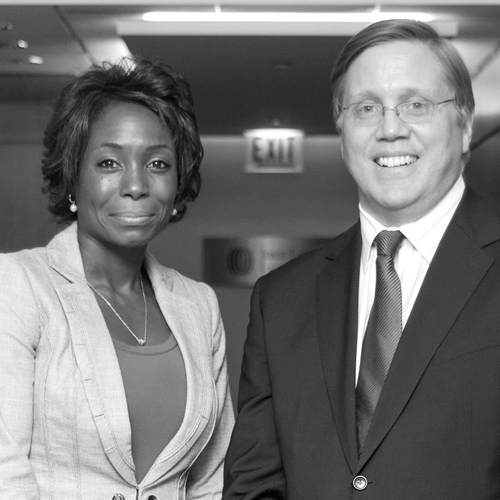Success sometimes brings unwanted attention. For e-commerce companies, that attention often comes in the form of patent lawsuits, some with merit but many without. In an increasingly litigious environment, Lee Cheng, chief legal officer and senior vice president of corporate development at Newegg Inc., says his team opted for an atypical strategy when Soverain Software came knocking with a baseless patent lawsuit. “In patent litigation—and specifically the Soverain litigation, where we were defendants against a very notorious and well-established, well-funded patent troll—we have taken the position that we were going to do what’s right.” Newegg could have followed the conventional playbook and settled. But instead the company fought and won.
A strong corporate philosophy at Newegg helped set the stage for charting a new course. The vast majority of companies choose to resolve patent-trolling litigation by paying off the plaintiff, but Cheng says that formula just wasn’t going to work anymore. “It’s not that we have a policy against settling or resolving disputes when the circumstances call for it,” he explains. “But it has to make strategic sense.” Cheng says that Newegg’s business objectives are to provide products and services to its customers at a fair price, and to generate a fair return for shareholders. “Any outcome has to be consistent with those objectives,” he says.
Early in his career at Newegg, Cheng worked with the rest of the leadership team to identify patent litigation as one area that required a strategic response. “If we didn’t take a strategic stand, we would be ceaselessly targeted,” Cheng says. He was concerned that responding to litigation by only paying plaintiffs off would have a negative impact on the business and the services provided to customers. When the Soverain case came up, with its unfounded patent claims and its demands for payment of ongoing revenue percentages, Cheng says that Newegg “knew we would literally never hear the end of it, so we made a tough choice. Instead of doing what everyone else did—including our competitors—we were going to figure out a way to vigorously and intelligently defend ourselves.” But the strategic result Cheng wanted wasn’t just to mount any defense. “We were going to make ourselves a very undesirable target for all lawsuits,” he recalls.
Getting to Know
Lee Cheng
What’s the best advice you’ve ever been given?
Do what’s right. Whenever you have an issue, if you do what’s right, you’re never going to regret it. I certainly haven’t.
What motivates you most in life?
My kids. If people want to know what my selfish motivation is for working the hours that I work, it is to secure a better future for them; it drives everything I do.
Which part of your job could you live without?
The paperwork. There’s a lot more paperwork than I would prefer, but that’s part of being a lawyer.
What is the one thing you would change about your industry?
We have to figure out how to make lawyers understand—and practice based upon—performing their fiduciary obligation to their client. That means putting their clients’ interests above their own, always.
What’s your favorite part of the workday?
When I solve a problem in a way that achieves a uniquely positive result.
Cheng quickly recognized that controlling Newegg’s cost of defense would be key in reaching a resolution that followed the company’s longer-range strategic philosophy. He first identified where expenses normally piled up during patent litigation: the discovery process. Based on the position that Newegg had done nothing wrong and therefore didn’t need to proceed under a cloud of fear, Cheng examined the discovery expenditures typically incurred by companies in Newegg’s position, and determined that many of them were “significantly artificial,” which, he adds, “is a polite way of saying a rip-off.”
One area Cheng focused on was e-discovery, where monstrously large amounts of money are often spent. “I simply asked some basic questions of my outside counsel and e-discovery vendors,” Cheng recalls. He learned that costs to accomplish even the most basic tasks, such as copying electronic records, were often inflated, a notion he openly challenged. “Instead of paying the quoted $30,000 to copy 40 [gigabytes] of data, we had our IT professionals in-house do the copying for under $1,000,” he explains. “Just by asking some very basic questions instead of buying into the sales pitch of outside vendors, whose interests are not aligned with my company, we stripped out a huge amount of cost.”
After reducing discovery costs by an estimated 80 percent, Cheng looked carefully at who would help represent the company during the litigation. “I made sure my outside counsel understood what the right marching orders were and what our focus was,” he says. Rather than mounting what conventional wisdom would consider a vigorous defense—one that Cheng says typically involves “throwing paper at the other side,” and generating huge fees as a result—Newegg had its eye on the legal equivalent of guerilla warfare. “I wanted to control our costs so I could make the other side do what they didn’t want to do, which was go to trial,” Cheng says.
Looking for what he calls “uniquely positive outcomes” is something Cheng has done throughout his life. Before joining Newegg he was at law firm Latham & Watkins, and before that he worked for several start-up companies. “In terms of everything I do, I first try to think about the outcome I want to achieve,” he says. “Then I try to reverse engineer the outcome using a playbook that’s different from what everybody else uses.” Throughout Cheng’s career, the approach has caused him to ask questions and challenge fundamental assumptions. “I use different tactics than what patent-litigation counsel would typically use,” he says.
In concert with his unconventional strategy, Cheng has always been keen to move beyond simply playing defense. And when it comes to patent trolls, that approach is key. “The troll industry has been going crazy,” he says. Cheng contends that trolls are unconcerned about whether their claims have any legitimacy, because small victories are all they need to keep the game going. “Right now their tactic is to sue dozens of companies and extract settlements, then they dismiss the lawsuits,” Cheng says. “There are no negative consequences for these trolls for filing frivolous lawsuits. There is a complete lack of symmetry in patent law.” Newegg, fueled by a strong corporate philosophy and Cheng’s own penchant for doing what he believes is right—rather than what is convenient—is a “rare defensive player” in the ongoing war against patent trolls.
When Newegg’s approach was vindicated in court, a number of other companies embroiled in litigation with Soverain also benefited. Their perspective on fighting patent trolls may be forever changed because Cheng and Newegg turned conventional wisdom on its head by proving that patent trolls could be soundly beaten anywhere. And what does Cheng’s fervent pursuit of fairness mean for Newegg? “No plaintiff will be allowed to file a lawsuit against Newegg without negative consequences,” he says.

